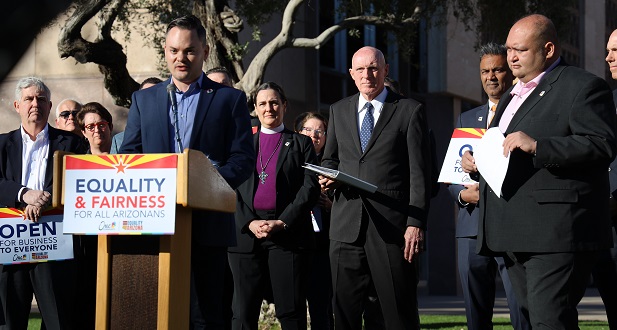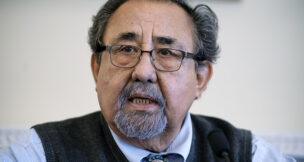Bowers backs bid to stop gay, transgender discrimination
Nathan Brown Arizona Capitol Times//February 7, 2022//
Bowers backs bid to stop gay, transgender discrimination
Nathan Brown Arizona Capitol Times//February 7, 2022//

House Speaker Rusty Bowers is throwing his weight behind a bill to ban discrimination against gay and transgender people.
“It is the doctrine of my faith that we are all brothers and sisters, and we belong to the family of God,” Bowers, R-Mesa, who is a member of the Church of Jesus Christ of Latter-day Saints, said at a news conference Monday morning surrounded by local business leaders and LGBTQ rights advocates.
“This bill will be a major victory for fairness and equality for all Arizonans,” said Mesa Mayor John Giles, whose city passed a non-discrimination ordinance last year.
Bowers paraphrased Romans, in which Paul the Apostle calls on people not to judge others or put “a stumbling block” in a brother’s way.
“Too long we have held onto opinions and thoughts that are stumbling blocks to each other,” Bowers said.
Arizona bars discrimination against gay and transgender people in public employment, and some, mostly Democratic-run cities and counties have enacted local anti-discrimination measures. However, like most Republican-run states, Arizona doesn’t have a statewide law protecting gay and transgender people from discrimination in housing, employment or public accommodations.
An anti-discrimination law was introduced in 2020, with then-Sen. Kate Brophy McGee, R-Phoenix, sponsoring it in the Senate and Rep. Daniel Hernandez, D-Tucson, who is one of the Legislature’s few openly gay lawmakers, in the House. It never got a hearing; one of the reasons for this was Bowers opposed it then, according to news reports.
Rep. Amish Shah, D-Phoenix, one of the sponsors of this year’s bill, said it will cover employment, housing and public accommodations, meaning a business couldn’t refuse to serve someone because they’re gay or transgender. He said it would also add new protections for religious minorities and would ban medical professions from practicing conversion therapy, or therapies aimed at trying to turn gay teens straight, on minors. Amish said the bill was crafted by people working together “in values of fairness and freedom for all.”
“While we don’t always agree on everything, we’ve never turned away from this conversation,” he said.
The bill does include exemptions for religious institutions.
“We did that because we very much believe in religious freedom for religious institutions,” said Michael Soto, executive director of Equality Arizona.
The religious exemptions would apply to religious institutions, not individuals, so a business owner or employer who has religious objections to homosexuality would still be required to serve someone.
“We also believe that businesses should serve everyone. … We don’t have to agree with one another to serve one another,” Soto said.
LDS Church leaders, who supported a less-far reaching nondiscrimination bill that passed in Utah in 2015, issued a statement Monday supporting the Arizona bill.
“It is our position that this bipartisan bill preserves the religious rights of individuals and communities of faith while protecting the rights of members of the LGBTQ community, consistent with the principles of fairness for all,” the statement said.
Bowers said the bill will get a hearing, but he hasn’t yet decided in which committee.
“This will receive a hearing,” Bowers said. “I have not yet decided how it can. … I want this to be treated with respect and dignity, so a committee that can all have that is how I want to have it done.”
“This will receive a hearing. I have not yet decided how it can … I want this to be treated with respect and dignity, so a committee that can all have that is how I want to have it done.”
House Speaker Rusty Bowers, R-Mesa
Bowers didn’t say whether he felt comfortable letting the bill receive a floor vote if he doesn’t have 16 Republicans on board. In his remarks, he acknowledged it could be a struggle to get the bill passed.
“I don’t anticipate a rose-strewn path in front of me, but we are here honorably and working together,” he said.
The bill does not address the issue of whether transgender youth should be allowed to play on the team of their gender identity; another bill which passed the Senate on a party-line vote last week would only let student athletes play for the team of the sex they were assigned at birth. Soto said the bill doesn’t address that issue because many of its backers think decisions on those policies should be made locally or by athletic associations, not mandated at the state level.
While Cathi Herrod, president of the socially conservative Center for Arizona Policy, hadn’t seen the proposed bill as of Monday morning, she didn’t like what she was hearing at the press conference. She called the bill a “compromise in name only,” especially if it is like the Mesa city ordinance, which her group opposed and unsuccessfully tried to overturn. Herrod also objected to the lack of religious exemptions for individuals and said the law would recast disagreement as discrimination.
“The cake bakers, the florists, (will be) forced to choose between their livelihood and their faith,” she said.
Herrod also objected to the conversion therapy ban.
“Parents should have the right to direct the upbringing and the medical care of their children without interference from the government,” she said.


















